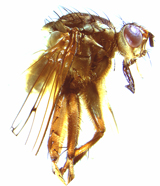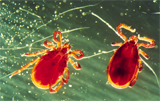Survey for infections with medically and ecologically relevant microorganisms in Arthropods
Table of contents
The maternally transmitted bacterium Wolbachia and other endosymbionts, such as Rickettsia, Spiroplasma, Coxiella, and Cardinium species, are known to affect their hosts in a variety of ways in order to favour their own transmission. It is expected that these microbes will have evolved over time as a result of interactions between the host and the bacterium. It is now recognized that such heritable microorganisms are very widespread in arthropods. However, with a few exceptions (e.g. Drosophila), no detailed systematic screens for such symbionts have been conducted for large numbers of species belonging to the same family. In our projects, we will aim to fill this gap by testing a wide range of species and samples belonging to the Diptera (fly) families Dolichopodidae and Scathophagidae. In addition, Rhipicephalus tick samples (Acari) will also be tested for the presence of these epidemiologically and ecologically interesting microorganisms. Rhipicephalus ticks are medically relevant vectors of microorganisms and are a complex of species endemic to tropical and subtropical regions, including the Mediterranean countries. These ticks have been imported to several parts of central and northern Europe. In Switzerland, they have occasionally been recorded since 1940 and their establishment in Ticino and partly in Grisons was confirmed in the nineties. Using molecular laboratory methods, we intend to determine the taxonomic identity of the Rhipicephalus ticks recently collected in Zurich and, as already mentioned, to test for the presence of microorganisms of such as Coxiella, Rickettsia, and Wolbachia.
Participants
Dr. Marco V. Bernasconi (Project leader)
Christoph Germann (Ph.D. student)
Co-operation partners
Dr. Oliver Y. Martin (ETH Zurich)
Isabel Landau Lüscher (Beratungsstelle Schädlingsbekämpfung Stadt Zürich)
Publications
Publications
- Casati S., Bernasconi MV., Gern L., Piffaretti J-C. (2008). Assessment of intraspecific mtDNA variability of European Ixodes ricinus sensu stricto (Acari: Ixodidae). Infection, Genetics and Evolution, 8(2):152-158. DOI: 10.1016/j.meegid.2007.11.007
- Bernasconi MV., Casati S., Péter O., Piffaretti J-C. (2002). Rhipicephalus ticks infected with Rickettsia and Coxiella in Southern Switzerland (Canton Ticino). Elsevier: Infection, Genetics and Evolution 2: 111-120. DOI: 10.1016/S1567-1348(02)00092-8
- Bernasconi MV., Valsangiacomo C., Balmelli T., Péter O., Piffaretti J-C. (1997). Tick zoonoses in the southern part of Switzerland (Canton Ticino): occurence of Borrelia burgdorferi sensu lato and Rickettsia sp. European Journal of Epidemiology 13: 209-215. DOI: 10.1023/A:1007394901846

